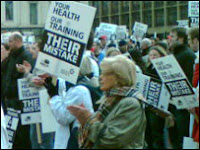
Following pressure by a number of different sources including David Cameron and Andrew Lansley MTAS application system for junior doctors system is being changed. Juniors will now be given a fairer chance by being able to submit their CV and having the guarantee of at least one interview. It is a pity that the fiasco was allowed to happen
STATEMENT BY THE REVIEW OF RECRUITMENT AND SELECTION FOR SPECIALTY AND GP TRAINING – THURSDAY 22 MARCH 2007
Building on last week’s announcement, at a minimum, every long list able applicant who applied through MTAS and meets the eligibility criteria for their relevant specialty will be invited for an interview. Under this guaranteed interview scheme, candidates will be able to choose which of their preferences to be interviewed for in light of geographic specialty-specific and ST level-specific competition ratios which will be available on the MTAS website. We are in discussion about the implications
of this for the timetable.
The recruitment system has worked satisfactorily for General Practice and this will continue. In other specialities, there is evidence that the shortlisting process was weakand we will therefore eliminate this part of the process immediately. In contrast, the interview process has been working and therefore the revised approach will ensure that all long listable candidates will be interviewed. The Review Group believes that this new approach is the most equitable and practical solution available. The Group also recognises the enormous effort by the consultants, service and deans that has already taken place to ensure that the interview process has worked. The time and effort required for further interviews is recognised by the service and the time required will be made available. Therefore first choice interviews that have already taken place should not need to be repeated.
In accordance with the advice already issued, we reiterate that all interviews will be informed by the use of CVs and portfolios and probing questions.
In broad terms, this means that all eligible applicants at every stage of their training, whether or not they have already had interviews or interview offers, will be able to review their stated first choice preference and have the opportunity to select the one for which they want to be interviewed.
We will be discussing operational details over the next week and these may differ between specialties and between different parts of the UK dependent on local circumstances. We will also consult widely. Exact details for how applicants will be able to do this will be available week commencing 2 April on the MMC website at www.mmc.nhs.uk. In the meantime, interviews will continue and applicants should attend unless they are confident that this will not be their preferred choice.
No job offers will be made until all these interviews have taken place. Discussions are taking place on the implications of this for the filling of General Practice training places. We expect that the majority of training places will be filled through these interviews. Unfilled vacancies will be filled through further interviews.
The Review Group has recommended the development of a programme of career support for applicants at all stages of the process. Further details to support applicants, deans and selectors through this process will be available next week on the MMC website. Future work will explore what the possibilities might be for doctors to change specialties.
Professor Neil Douglas




